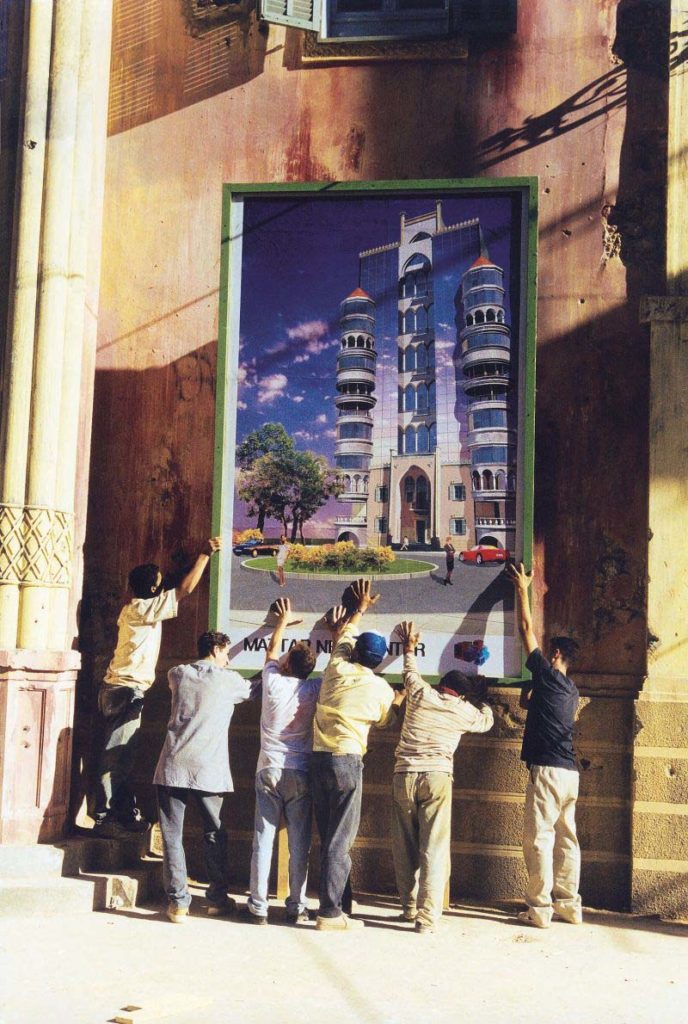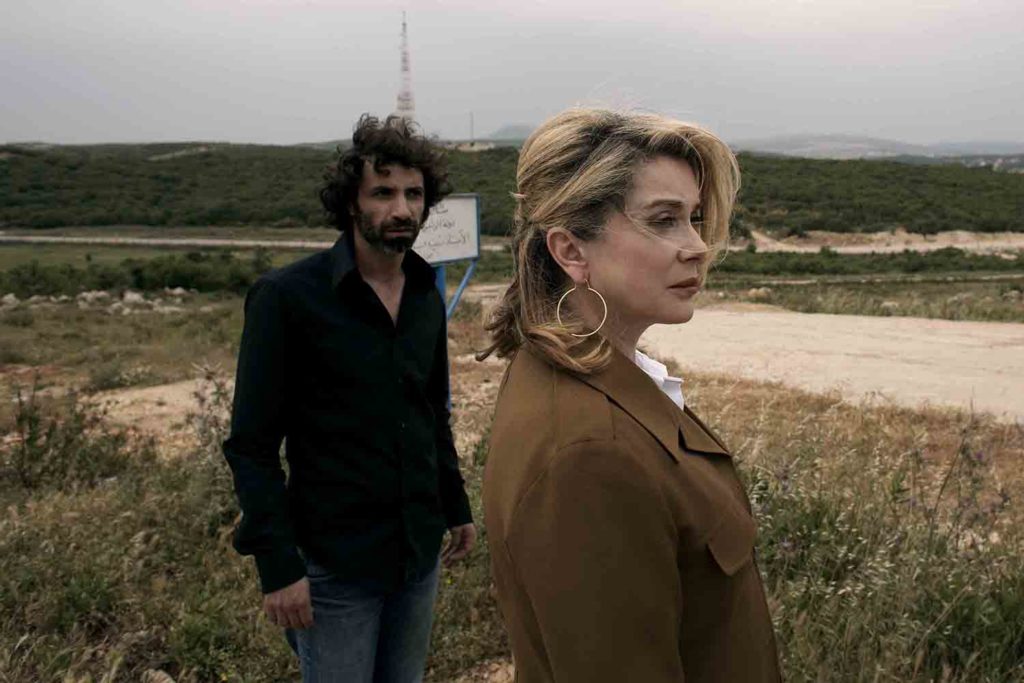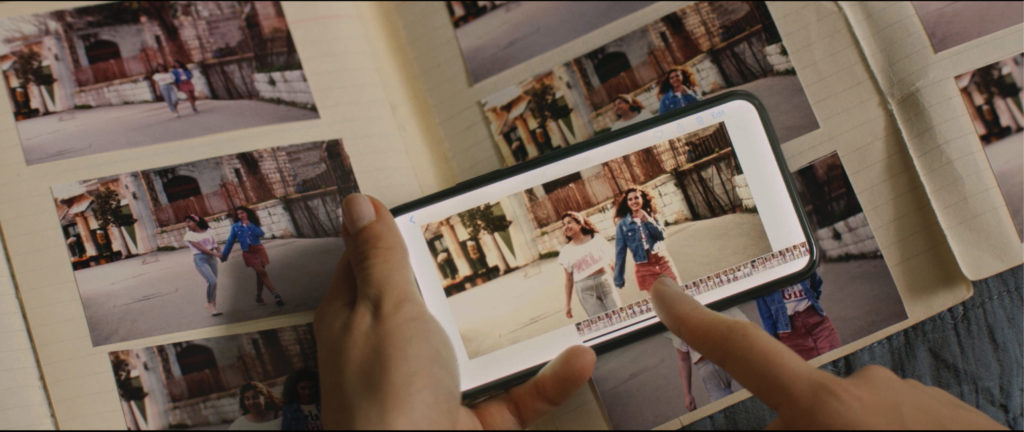Article by Elio Sacchi
Translated by Federica Maria Briglia and Mattia Prelle
The cinema of Joanna Hadjithomas and Kalil Joreige – to whom the thirty-ninth edition of the Turin Film Festival dedicated a solo show and a masterclass, both curated by Massimo Causo – may lie between the beginning and the end of their artistic and cinematographic career. That means it is between the postcards of the opening credits of their first feature film, Around the Pink House (Al Bayt Al Zaher, 1999), and the box, the audiovisual archive of memory and remembrance that, like a very personal and foreign body, opens Memory Box (2021). Between these two extremes, within the more general framework of the history of Lebanon, of its destruction and of its reconstruction, there is a long and complex reflection on cinema, on the status of the image and, in particular, of the memory-image. When the past passes, the construction of a collective and shared memory becomes a difficult operation, which leaves enough room for memories and handy images that preclude the possibility of a complex narrative in favour of a superficial, conciliatory and pacifying narrative. This is what often happens after internal or fratricidal wars, which are followed by a reconstruction so fast that the past cannot be processed. This is also the case of Lebanon, considered the Switzerland of the Middle East in the 1960s: it was turned upside down first by a civil war and then by the conflict with Israel. The whole artistic parable of Hadjithomas and Joreige refers to this reality, and, in addition to cinema, crosses over into photography, performance arts and plastic arts. Their artistic parable contains its own moment of reflection and self-reflection. It is particularly evident in the performance Aida Sauve Moi, which makes explicit the questions that drive the expressive and creative urgency and necessity of the two directors: this is an indefinite and permeable border between reality and fiction, between personal experience and history. Their parable also contains the concept of latency, which is not only the physical, chemical and material concept of the negative impressed and never developed, but it also represents all the individual and particular latent stories, existing and never revealed, of the kidnapped and murdered Lebanese citizens, and of all the corpses that have never been found. Other elements included in their artistic parable include: the materiality of the image and of the testimonial object itself; the crossing and the attempt to take back public and collective spaces; and, finally, a boundless love for cinema. The last of these elements should be interpreted above all as an instrument of resistance and political commitment (in this regard, see Open the Door, Please [2006], a passionate and cinephile homage to the cinema of Jacques Tati). Joanna Hadjithomas and Kalil Joreige’s one is a self-reflexive cinema that also reflects on the status of the images it represents. This cinema has its genesis precisely in the overexposure to stereotyped images, whether they concern the civil war or the 1960s, as witnessed during the masterclass entitled Memory Work – Resistant Aesthetics in Hadjithomas & Joreige’s works (Rosita Di Peri also attended the event).

Actually, Around the Pink House has its origin in an earlier photographic project called Wonder Beirut. Hadjitomas and Joreige invented the figure of a Lebanese photographer, who immortalised Beirut in the 1960s and 1970s, before the civil war; the photographer then literally and materially burnt the buildings depicted on his postcards as they were bombed until the images were completely transfigured. The film does not tell the story of the Lebanese civil war, but rather the reconstruction of the capital in the 1990s, a period in which “the sound of bombs has given way to that of bulldozers” and in which the rubble shown in the background, physical and painful traces of a recent past, enters into a profound dialectic with the story of reconstruction and rebirth, which nonetheless involves the destruction of entire buildings. The maison rose itself is an archive of memory, of Lebanon’s history, a physical place that bears the marks of war, the memories of people who disappeared and the presence of refugees who were forced to leave their villages.
The maison rose is also an attempt done by a community to take its space back. This is the same public and collective space that Catherine Deneuve, the spirit of European cinema invoked in Lebanon as a foreign and empathetic body and led by Rabih Mrué (a recurring actor in the filmography of Hadjithomas and Joreige, he is a face that embodies the generational drama), wants to see but is prevented from doing so.
Je veux voir (2008) is a journey through a country devastated by the conflict with Israel. It stems from the need to show unconventional images (i.e. different from those broadcast by the various television stations) and to investigate new places, in a sort of palingenesis of the gaze and images of war. While in Rounds (2001), the wandering around the city – a Beirut that uses the rubble of buildings to build new roads by the sea – programmatically precludes the vision of public and city space, which is relegated to an off-screen that is always overexposed. Kiam 2000 – 2007, which began in 1999 and ended in 2008, is also the ideal counter-field to Je veux voir, since the detention camp described in it is an absolute off-screen narration, which can be only imagined by the human testimonies of the internees who invite us to reconstruct it in absentia. The film opens, once again, to an explicit reflection on memory. In 2006, in fact, the camp was turned into a museum and, still in 2006, was bombed by the Israeli army. Made almost entirely with rigorous close-ups and extreme close-ups, these vicissitudes gave rise to the need for Kiam: the urgency of the testimony necessarily refers to the camp, to its presence, it summons it and ultimately affirms its existence.

Their cinema is constantly in communication with the absence and the missing pictures, both personal, as in The Lost Film (Al Film Al Mafkoud, 2003), and collective (The Lebanese Rocket Society, 2012). And the ghost – as the directors admitted more than once – is a recurring figure in Lebanese culture and in its people’s daily life. A Perfect Day (Yawmoun Akhar, 2005) deals with ghost stories: piled up corpses in mass graves that no one discovered during the reconstruction of Beirut liven up and expand the story, claiming through a deafening silence their existence and death. This is a matter of faith and persistence of memory, because who believes in the ghost’s survival will be able to see it and reunite with it, whereas who tries to forget is forced to roam along the streets of a city that cannot be owned and cannot be seen (the contact lens do not adjust the sight, they rather produce a twisted and hallucinated vision of Beirut). Moreover, the film is based on the story of Joreige’s uncle, kidnapped during the war and still “missing”; one day, after many years, the directors found an undeveloped photo negative, a latent and phantasmal picture. The decision of transforming the negative-in-power into image-in-act corresponds to the desire of bringing back to light a unique and universal story, both personal and collective, through different concrete manipulations of the film. This story carries the marks of history, of the flow of time. Similarly, the city of Smirne is, in its reconstruction, a physical trace of the history passage: in Ysmirna (2016) the comparison between the early 1900s city map and the modern one shows the temporal distance of a mythical city, told by Joanna’s family and the one of the poet Etel Adnan (both of them have never been in the city of, respectively, their grandparents and parents), through an oral storytelling that intends to be a reenactment of a past in which one can find their roots.
Hadjithomas and Joreige’s more than twenty years of artistic activities and personal experiences break into a Lebanese family migrated to Canada, in the form of a big cardboard box. The package from Lebanon is an archive containing letters, photographs, notebooks, recordings of radio broadcastings and undeveloped films (Memory Box is freely inspired by the mailing correspondence that Joanna had with a friend of hers who migrated to Paris, suddenly interrupted after six years). This is an archive that causes the explosion of the underlying conflicts between the three different generations and, at the same time, it’s responsible for the deflagration of the film. Even if most of the films by Hadjithomas and Joreige have a material essence (and most of the films shown during the retrospective were projected in 35mm), Memory Box has a digital concept. Alex, the daughter, edits and manipulates the civil war testimonies according to her own grammar, which includes smartphones, instant communication, digital post-production and immateriality. The distance in space and time, and the reconstruction of the 1980s through their icons are not nostalgic at all, they are just needed to testimony and transfer the story. The intergenerational confrontation (the grandmother, Maia; the mother, who represents the directors’ generation; and the daughter) is about approaching the story of Lebanon, and thus becomes a matter of identity and belonging, that is opening up several possibilities of the storytelling for those generations that never experienced the conflict and whose memory may be lost.

The one of Joanna Hadjithomas and Khalil Joreige is an artistically and conceptually coherent career that finds its raison d’être in the moral duty of making concretely, materially and visibly collective and public what the passage of the story of Lebanon has discolored, as if the past were an unimpressed and undeveloped film. An idea of political and civic cinema, a product of more than twenty years of activity that displays in the intergenerational confrontation of Memory Box the need to narrate the past in order to live the present and to imagine the future once again.


















